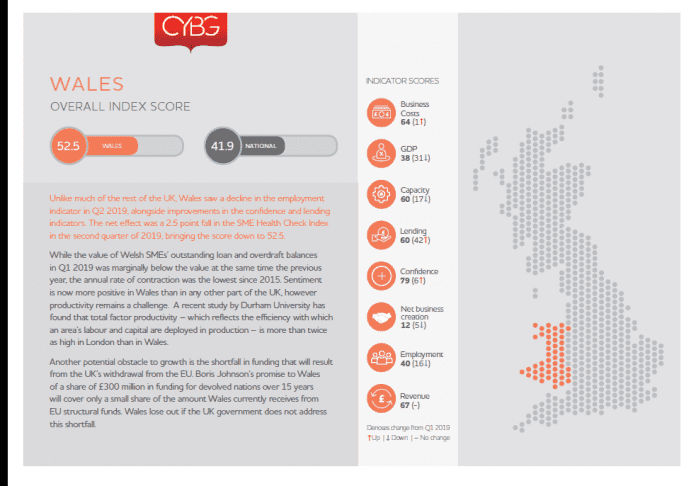- SME Health Check Index for Wales fell in Q2
- Unlike much of the rest of the UK, Wales saw a decline in the employment indicator but an improvement in the confidence indicator
- Wales’s population of businesses is the least diverse in the UK in terms of the industries in which they operate
The SME Health Check Index, a quarterly measure of performance and outlook for SMEs, fell by 2.5 points in Wales bringing the score down to 52.5. The main driver of the decline was the employment indicator in Q2, but this was offset by improvements in the confidence and lending indicators. While the value of Welsh SMEs’ outstanding loan and overdraft balances in Q1 2019 was marginally below the value at the same time the previous year, the annual rate of contraction was the lowest since 2015.
SME sentiment is now more positive in Wales than in any other part of the UK. Nevertheless, despite the relative optimism of Welsh businesses, productivity remains a major challenge for the local economy.
The SME Health Check Index, which is published by CYBG in partnership with leading economic consultancy, The Centre for Economics and Business Research (Cebr), draws on data and qualitative information from a wide range of sources. It is designed to ‘take the temperature’ of the UK’s SME community as a whole, and provide a comprehensive overview of the challenges and opportunities it currently faces.
For the UK as a whole, the Index fell by 6.9 points to 41.9 in Q2 2019, as economic and political uncertainty continued to weigh on business confidence. Again, however, the study overall reveals a mixed picture, with continued resilience in the UK labour market, and encouraging insights on business diversity.
The reduction in the headline figure across the UK was driven by falls across the majority of indicators comprising the Index, including the first quarterly contraction in GDP in Q2 since the final quarter of 2012, as well as declines in capacity, lending and net business creation measures. There was more positive news for employment, with the relevant indicator rising by 5 points, as SMEs continued to hire. Employment reached 32.8 million in Q2, 114,000 higher than in Q1 and 425,000 higher than in Q2 2018.
In the second quarter of 2019, all regions with the exception of Wales had an annual rate of business cost inflation of 2.7% – in line with the UK average. In Wales’ case, the relatively high share of activity that takes place outside of the services sector meant that the annual rate of cost inflation fell by 0.2 percentage points to 2.6% in Q2.
SME diversity offers protection as tough conditions persist
In a special report this quarter, the Health Check Index also examines how the complexity and diversity of UK SMEs enhances their ability to deal with the ongoing political and economic uncertainty. Looking at companies from a range of perspectives – including diversity in products, customers, suppliers, geography and workforce composition – the research sought to ascertain how far companies have protected themselves from sudden disruption or shocks.
Wales’s population of businesses is the least diverse in the UK in terms of the industries in which they operate. Three in ten Welsh SMEs work in one of three sectors: crop and animal production (13%), specialised construction activities (9%), and retail (9%). However, the data points to a significant split between Wales’ major cities and the nation as a whole. For example, Cardiff’s business population is the third most diverse out of the 25 UK cities analysed, driven by a lower prominence of firms in the retail and construction sectors and a higher representation in professional activities including financial services and legal services.
Nearly one in five (17%) of Welsh SMEs surveyed stated that their business operates in multiple regions. This gives Wales the highest score in the UK along the geographical diversity measure. The survey results show that Welsh SMEs have the closest ties to the neighbouring West Midlands region.
The complexity of Wales’ export basket is below the UK average. While Wales’ climate and topography provide it with a natural comparative advantage in agricultural fields such as animal rearing and dairy production, there are relatively limited areas of strength reflected in the data for manufacturing exports.
Gavin Opperman, Group Customer Banking Director, at CYBG, said: “The health of Wales’s SMEs is pivotal to the success of our wider economy, and the picture painted by the results this quarter was mixed. We saw a fall in the region’s headline index, but some improvements across confidence and lending indicators.
“On the surface things may look a little gloomy across the UK, but cause for optimism can be found. The overall labour market has remained resilient, with SMEs continuing to hire, and wages continuing to grow, despite the tougher conditions. Further, an analysis of workforce composition, customer base and supplier relationships has revealed some encouraging insights on SME diversity across many parts of the country, indicating a good ability to handle sudden change or shocks.
“Here at CYBG we are committed to helping SMEs prosper and grow. We are optimistic that with a careful strategy and access to adequate support, businesses have the resilience to weather the storm.”
Help keep news FREE for our readers
Supporting your local community newspaper/online news outlet is crucial now more than ever. If you believe in independent journalism, then consider making a valuable contribution by making a one-time or monthly donation. We operate in rural areas where providing unbiased news can be challenging. Read More About Supporting The West Wales Chronicle






















